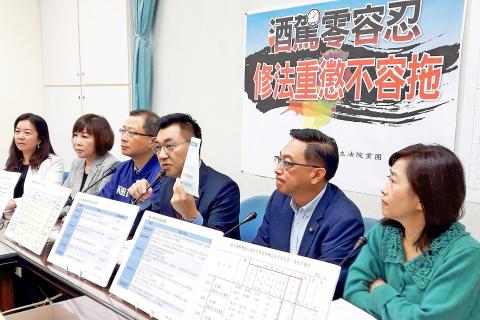The Chinese Nationalist Party (KMT) caucus yesterday urged the Executive Yuan to step up efforts to tighten rules against driving under the influence (DUI) of alcohol or narcotics.
In the wake of a recent spate of deaths resulting from drunk driving incidents, lawmakers across party lines have submitted more than 20 draft amendments in a bid to strengthen penalties for DUI.
However, aside from Premier Su Tseng-chang (蘇貞昌) expressing his “rage” on Facebook, the Cabinet has yet to propose any amendments, which raises the question of whether it is serious about tackling the problem, KMT caucus whip Johnny Chiang (江啟臣) told a news conference at the Legislative Yuan in Taipei.

Photo: CNA
In 2013, lawmakers raised the maximum prison term for a DUI incident that resulted in a death to 10 years, which has helped reduce the number of drunk driving cases, he said.
However, from 2014 to last year the number of repeated offenses increased by one-third, he added.
The caucus has scheduled a public hearing on its proposed amendments for Tuesday next week, urging the Ministry of Justice to swiftly put forward its draft amendments, he said.
Statistics have shown that raising penalties can deter drunk driving, but the most recent amendments have had a limited effect, KMT caucus secretary-general John Wu (吳志揚) said.
The ministry has opposed proposals by lawmakers to stiffen penalties for drunk drivers, saying such efforts would be “disproportionate,” but over the years, society has arrived at a consensus of zero tolerance for fatalities caused by drunk driving, Wu said, urging the ministry to heed public opinion and not to obstruct the KMT’s proposals.
A draft amendment to the Criminal Code sponsored by Chiang and 19 others seeks to raise the penalty for DUI from a maximum jail term of two years and a maximum fine of NT$200,000, to seven years and a maximum fine of NT$500,000.
The proposed amendment would also stipulate the death penalty, life imprisonment or a maximum prison term of 12 years for fatal drunk driving offenses.
Meanwhile, a proposal by Wu and 16 others seeks to impose the death penalty or life imprisonment on repeat DUI offenders.
KMT legislators Huang Chao-shun (黃昭順) and Shen Chih-huei (沈智慧) have also proposed amendments to the Criminal Code recommending the death penalty or life imprisonment for causing fatalities as a result of driving under influence of alcohol or drugs.
Another proposal by Wu to amend the Road Traffic Management and Penalty Act (道路交通管理處罰條例) would impose a fine of between NT$90,000 and NT$180,000 on people driving under the influence of alcohol or narcotics who refuse to comply with police request for an inspection and drive off.
A proposal by KMT Legislator William Tseng (曾銘宗) to amend the act recommends a fine of NT$150,000 for people who knowingly ride with a drunk driver.
Tseng’s proposal also seeks to have repeat offenders install alcohol sensors and automatic carburetor locks in their vehicles, and to allocate a proportion of fines collected to fund efforts to combat alcoholism.

Taiwan would welcome the return of Honduras as a diplomatic ally if its next president decides to make such a move, Minister of Foreign Affairs Lin Chia-lung (林佳龍) said yesterday. “Of course, we would welcome Honduras if they want to restore diplomatic ties with Taiwan after their elections,” Lin said at a meeting of the legislature’s Foreign Affairs and National Defense Committee, when asked to comment on statements made by two of the three Honduran presidential candidates during the presidential campaign in the Central American country. Taiwan is paying close attention to the region as a whole in the wake of a

Chinese Nationalist Party (KMT) Chairman Eric Chu (朱立倫), spokeswoman Yang Chih-yu (楊智伃) and Legislator Hsieh Lung-chieh (謝龍介) would be summoned by police for questioning for leading an illegal assembly on Thursday evening last week, Minister of the Interior Liu Shyh-fang (劉世芳) said today. The three KMT officials led an assembly outside the Taipei City Prosecutors’ Office, a restricted area where public assembly is not allowed, protesting the questioning of several KMT staff and searches of KMT headquarters and offices in a recall petition forgery case. Chu, Yang and Hsieh are all suspected of contravening the Assembly and Parade Act (集會遊行法) by holding

PRAISE: Japanese visitor Takashi Kubota said the Taiwanese temple architecture images showcased in the AI Art Gallery were the most impressive displays he saw Taiwan does not have an official pavilion at the World Expo in Osaka, Japan, because of its diplomatic predicament, but the government-backed Tech World pavilion is drawing interest with its unique recreations of works by Taiwanese artists. The pavilion features an artificial intelligence (AI)-based art gallery showcasing works of famous Taiwanese artists from the Japanese colonial period using innovative technologies. Among its main simulated displays are Eastern gouache paintings by Chen Chin (陳進), Lin Yu-shan (林玉山) and Kuo Hsueh-hu (郭雪湖), who were the three young Taiwanese painters selected for the East Asian Painting exhibition in 1927. Gouache is a water-based

President William Lai (賴清德) has appointed former vice president Chen Chien-jen (陳建仁) to attend the late Pope Francis’ funeral at the Vatican City on Saturday on his behalf, the Ministry of Foreign Affairs said today. The Holy See announced Francis’ funeral would take place on Saturday at 10am in St Peter’s Square. The ministry expressed condolences over Francis’ passing and said that Chen would represent Taiwan at the funeral and offer condolences in person. Taiwan and the Vatican have a long-standing and close diplomatic relationship, the ministry said. Both sides agreed to have Chen represent Taiwan at the funeral, given his Catholic identity and